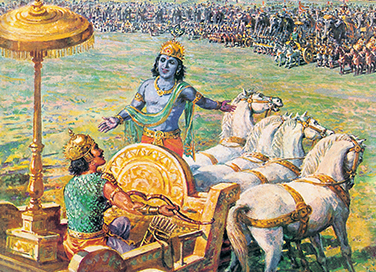5 Lessons from the Mahabharata
- October 1, 2021


5 Lessons from the Mahabharata
- October 1, 2021
By Krithika Nair and Ayushi Rakesh
Mahabharata, one of the longest epics in the world, is a lesson for life. There are many lessons worth imbibing in this great tale. The epic is full of inspiring characters like Bhishma, Drona, Karna, or even Ved Vyasa himself, who wrote the Mahabharata. Bhagavad Gita is an extension of the epic, which solely focuses on Krishna’s advice to Arjuna. So here are some lessons from the Mahabharata that we think are worth inculcating in our everyday life.
To receive more such stories in your Inbox & WhatsApp, Please share your Email and Mobile number.

The bond of friendship between Krishna and Arjuna made a journey of hardship endurable. Krishna had vowed not to fight in the Kurukshetra war, but his advice for Arjuna protected him more than any armour could. The pair represent the power of good companionship, under which even the most crushed spirit can brighten up and achieve the impossible. Arjuna was humiliated after he couldn’t defend the honour of his wife but Krishna never questioned his credibility. Instead, it was his support and encouragement that guided the Pandavas to victory. Such is the strength of true friendship.
What happened at Duryodhana’s court was an unspeakable horror. Bhima, to avenge Draupadi’s dishonour, had promised her the blood of Dushasana for his misconduct. Even if there was a victor, both sides lost a lot in the war. It was their determination to fulfil their given word that kept them going and led them to succeed in their almost impossible-looking resolution.
Throughout the story, there are many instances where the fates of people had changed because of the word they had given. Be it Eklavya losing his thumb, and therefore, his future as an archer, or Drona swearing to fight against his own dear pupils on the other side, each character put their words above their personal interests and honoured the promises they made.

Young Arjuna had the talent of archery which he was widely famous for. His brothers were equally good at it but the only difference between them and him was perseverance. Arjuna was dedicated and unswerving in his practice and staunchly focused on improving his skills. No amount of praise or fame as an archer made him lax in his practice. Due to his persevering nature, he could attain mastery of archery at such a young age, surpassing the talents of much older and experienced archers.
The Mahabharata teaches the valuable lesson of duty. Despite the bad hand that they had been dealt, the Pandavas took it in their stride and waited for their time. When it did arrive, Arjuna had a moment of conflict; the people behind enemy lines might have wronged his people, but they were still his family. It is here that Krishna teaches him to think beyond himself and his relationships and fulfil his duty as a warrior, without letting emotions cloud his judgement, that we all have to do things in life that we might not like or agree with, but it is our duty to perform these actions nonetheless.

Karna, the firstborn of Queen Kunti, was the son of Surya. He was disowned by his mother as she was unwed when he was born. Karna was adopted by Adhiratha, the chief charioteer of Hastinapura. Even when Karna was made the ruler of Anga, he was a people’s king, often mocked among other nobles due to his presumed lowly birth. This is why despite being on Kauravas’ side, he is still the most rational and empathetic character in the epic. He was a victim of circumstances due to the acts of Kunti, yet he had the heart to console her in her time of need. Even if he had no filial obligation to Kunti due to her abandonment, he promised her that she will always have five sons no matter what, by promising that he will only fight Arjuna and never kill the four others. Karna could empathize with his estranged family even after suffering insults all his life due to them, thus, highlighting his greatness.
Read the complete Mahabharata story in our three-volume set collection Mahabharata, now available on the ACK Shop and with major retailers and e-tailers.
To receive more such stories in your Inbox & WhatsApp, Please share your Email and Mobile number.

Comic of The Month
The Naval Journey of India Book I
This book is the first of a three-book series that takes a deep and detailed look at India's Naval History and a deep insight into the lives of our men and women in white. But any series on the Indian Navy has to start at the very beginning - exploring India's celebrated maritime history. Join our little hero, Bharat, and his grandfather, Commodore Sagar, as they sail into the deep blue waters of time. Book I of The Naval Journey of India takes a sweeping look at India's maritime endeavours, how the seas impacted us over millennia and how the oceans made us who we are.